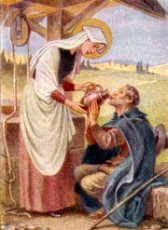Catholic Blesseds, Saints, Solemnities & Holy Days

Saint Zita
Feast Day: April 27
Patronage: Domestic Servants, Homemakers, Lost Keys, People Ridiculed for their Piety, Rape Victims
St. Zita was born in Tuscany in the village of Monsagrati. At the age of twelve, she became a servant in a wealthy household. In this position she was unjustly despised, overburdened, reviled, and often beaten by her employers and fellow servants for her hard work and obvious goodness. The incessant ill treatment was powerless to deprive her of her inward peace, the love of those who wronged her, and her respect for her employers. Her meek and humble restraint allowed her to succeed in overcoming the malice of her fellow servants and employers, so much so that she was placed in charge of all the affairs of the house. Their abuse had no hold on her, her faith kept her persevering forward, and her constant piety gradually moved the family to a religious conversion.
St. Zita believed that devotion is false, if slothful. She always considered her work as an assignment directly from God. As part of her penance, she obeyed her bosses in all things as being placed over her by God. She was always early to rise, and would spend much of her time in prayer prior to work, while others spent their time sleeping. She solemnly would attend Mass every morning, and had a great devotion. She was known to give her own food to the poor, rather than eating it. One day Zita left her chore of baking bread to tend to someone in need. The others servants, trying to get Zita in trouble, told the master. When they went to the kitchen to investigate, they found Angels in the kitchen, baking the bread for Zita, so she could help someone in need.
St. Zita died peacefully in the house of those she served on April 27, 1272. It is said that a star appeared above the attic where she slept at the moment of her death. She was 60 years old, and had served and the family for 48 years. By her death, she was venerated by many. There were over 150 miracles wrought on behalf of her intercession prior to her being canonized in 1696. Her body was exhumed in 1580 and was discovered to be incorrupt 425 years after her death. St. Zita’s body is currently on display for public veneration in the Basilica de San Frediano in Lucca. Her feast day is April 27th, and to this day, those celebrating her feast day bake a loaf of bread in honor of St. Zita. In 1748, Pope Benedict XIV added her name to the Roman Martyrology.
Practical Take Away
St. Zita was born in Tuscany, and had a very devout faith. She became a servant to a wealthy family at an early age in life, and was often abused. She was not only abused by her masters, but by the other servants. She always kept her inner peace, and never left them take that from her. She looked at her position as a placement from God, and offered her sufferings up as atonement for her sins. She attended daily Mass, and would take her food to the poor. One day while assisting someone in need, rather than baking her daily bread for the household, the master came in to investigate and found Angels baking her bread on her behalf. Her steadfast faith served as an example to those around her, and they converted to the faith. Her body was exhumed 425 years after her death and was found to be incorrupt. Her body is on display to this day, for the faithful to venerate.





